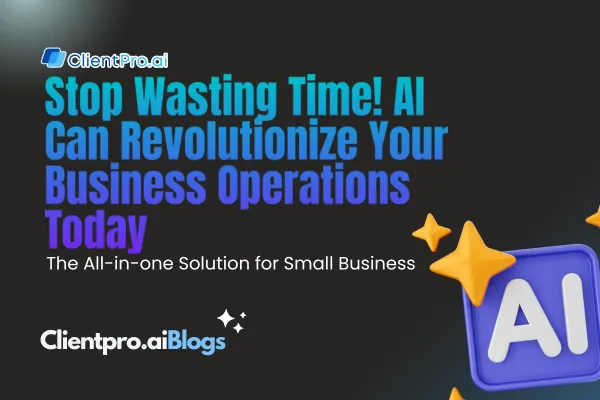Client Pro Blogs
Get Unlimited Leads With 'AI'
Download Our Free Ebook

Streamline Your Business Operations with AI Technology
Streamline Your Business Operations with AI Technology
Staying competitive requires leveraging cutting-edge technologies. One such technology that has revolutionized the way businesses operate is.
Artificial Intelligence (AI) . By harnessing the power of AI, organizations can streamline their operations, boost efficiency, and drive innovation. From automating routine tasks to predicting market trends, AI offers a myriad of opportunities for businesses to optimize their processes and make data-driven decisions.
This introduction delves into the transformative impact of AI technology on business operations, exploring how companies can harness its capabilities to gain a competitive edge in the market. Join us on a journey to discover how integrating AI into your business strategy can pave the way for enhanced productivity, cost savings, and sustainable growth.
Benefits of Using AI to Streamline Business Operations
The utilization of artificial intelligence (AI) has emerged as a game-changer for companies seeking to streamline their operations and gain a competitive edge. This blog section delves deeper into the benefits of using AI to streamline business operations, highlighting how AI can drive innovation, improve customer engagement, and foster growth across various industries.
Efficiency and Productivity Enhancement
AI technologies play a pivotal role in revolutionizing how businesses operate by automating routine tasks and processes. By harnessing AI-driven solutions, organizations can optimize workflows, reduce operational bottlenecks, and enhance overall efficiency. This increased efficiency translates into improved productivity and cost savings, allowing businesses to allocate resources more strategically. Moreover, AI can facilitate real-time monitoring and adaptive adjustments, ensuring continuous improvement in operational performance.
Automation of Repetitive Tasks
One of the primary benefits of AI is its ability to handle repetitive tasks with unparalleled accuracy and speed. From data processing to customer service interactions, AI systems excel at executing tasks that would be time-consuming for humans. By automating these mundane activities, businesses can ensure consistent quality, minimize errors, and free up employees to focus on tasks that require human ingenuity. Additionally, AI-powered automation can lead to significant time savings, enabling employees to dedicate their time to more strategic initiatives and creative problem-solving.
Improved Decision-Making and Insights
AI empowers organizations to make informed decisions by analyzing vast datasets and extracting actionable insights. Through advanced analytics and machine learning algorithms, businesses can uncover hidden patterns, predict future trends, and identify opportunities for growth. By leveraging AI-generated insights, companies can enhance their strategic planning, mitigate risks, and adapt swiftly to market changes. Furthermore, AI can facilitate scenario modeling and predictive analytics, enabling businesses to anticipate market shifts and proactively adjust their strategies.
Enhanced Customer Experiences
AI technologies, such as chatbots and personalized recommendation engines, enable businesses to deliver tailored experiences to their customers. By leveraging AI to understand customer preferences and behavior, companies can offer personalized services, anticipate needs, and enhance overall satisfaction. This personalized approach not only fosters customer loyalty but also drives revenue growth. Moreover, AI can enable hyper-personalization and predictive customer engagement, creating seamless and memorable interactions that build long-lasting relationships.
Innovation and Competitive Advantage
Beyond operational efficiencies, AI fosters innovation by enabling businesses to explore new opportunities, develop novel solutions, and stay ahead of market trends. By leveraging AI for research and development, companies can accelerate product innovation, optimize processes, and drive continuous improvement. Additionally, AI can facilitate predictive maintenance, quality control, and supply chain optimization, enhancing overall competitiveness and market positioning.
The integration of AI into business operations offers a multitude of benefits, ranging from operational efficiency and data-driven decision-making to enhanced customer experiences, innovation, and competitive advantage. As AI continues to evolve and permeate various industries, organizations that embrace these technologies will not only streamline their operations but also unlock new growth opportunities and drive sustainable success in a dynamic business environment.
Applications of Artificial Intelligence in Business Functions
Artificial Intelligence (AI) is revolutionizing various business functions across industries. Let's delve deeper into the applications of AI in different business functions:.
Marketing and Customer Support:
AI is transforming marketing and customer support strategies. In marketing, AI is not only personalizing campaigns but also optimizing ad placements, analyzing sentiment from social media, and predicting customer behavior. Customer support benefits from AI-powered chatbots that handle routine queries, provide 24/7 assistance, and escalate complex issues to human agents seamlessly.
Supply Chain Optimization:
AI's impact on supply chain management is profound. Beyond demand prediction and inventory management, AI is now used for dynamic pricing, route optimization, and even predictive maintenance of machinery. By leveraging AI in supply chain operations, businesses can reduce costs, minimize stockouts, and improve overall operational efficiency.
Data Analysis and Forecasting:
AI's role in data analysis and forecasting cannot be overstated. AI algorithms can sift through massive datasets to uncover hidden patterns, anomalies, and correlations that human analysts might miss. Moreover, AI-powered forecasting models are becoming increasingly accurate, aiding businesses in making proactive decisions based on real-time insights.
Human Resources and Recruitment:
AI is reshaping the HR landscape by automating repetitive tasks like resume screening, scheduling interviews, and even conducting initial candidate assessments. AI algorithms can match candidate profiles with job requirements more efficiently, leading to better hiring decisions and reduced time-to-fill positions.
Risk Management and Fraud Detection:
In the realm of finance and insurance, AI plays a crucial role in risk assessment and fraud detection. Machine learning algorithms can analyze transactional data in real-time to flag suspicious activities, prevent fraudulent transactions, and enhance overall security measures.
Personalization and Recommendation Systems:
AI is powering personalized experiences for customers through recommendation systems. By analyzing user behavior and preferences, AI can suggest products, services, or content tailored to individual needs, enhancing customer satisfaction and driving sales.
Predictive Maintenance and Asset Management:
AI's predictive capabilities extend to maintenance and asset management, where algorithms can predict equipment failures before they occur, enabling proactive maintenance schedules and reducing downtime. This proactive approach not only saves costs but also improves operational efficiency.
Market Research and Competitive Analysis:
AI tools are revolutionizing market research by analyzing vast amounts of data to identify market trends, consumer preferences, and competitive landscapes. Businesses can gain valuable insights for strategic decision-making, product development, and market positioning through AI-driven market research.
These examples underscore the versatility of AI in enhancing business functions, driving innovation, and fostering a data-driven culture. As businesses continue to adopt AI technologies, the landscape of traditional business operations is evolving rapidly, paving the way for a more efficient and competitive market environment.
Implementing AI Tools for Business Process Improvement
The integration of artificial intelligence (AI) tools has emerged as a critical strategy for organizations seeking to enhance operational efficiency and drive sustainable growth. The process of implementing AI tools for business process improvement encompasses a series of pivotal stages that are fundamental to achieving successful outcomes.
Data Preparation and Centralization
A foundational step in the implementation of AI tools involves meticulous data preparation and centralization. Organizations must ensure that the data required for AI algorithms is not only accurate and relevant but also properly structured and centralized. This process entails aggregating, cleansing, and structuring data from diverse sources to create a comprehensive dataset that serves as the foundation for training AI models.
Choosing the Right AI Solutions
In a market inundated with a plethora of AI tools and technologies, selecting the most suitable solutions is paramount. Businesses need to conduct a thorough assessment to identify AI solutions that align with their unique operational requirements and strategic objectives. Whether the focus is on machine learning, natural language processing, or computer vision, the selection of appropriate AI tools is instrumental in achieving desired outcomes.
Integration and Adoption Strategies
Following the selection of AI tools, seamless integration into existing business processes and widespread adoption across the organization are imperative. This necessitates close collaboration with cross-functional teams, provision of comprehensive training and support to employees, and continuous monitoring and refinement of AI tools to drive ongoing enhancements.
Performance Evaluation and Iterative Refinement
Beyond the initial implementation phase, continuous performance evaluation and iterative refinement of AI tools are essential. By analyzing key performance indicators and soliciting feedback from end-users, organizations can identify areas for improvement and fine-tune AI algorithms to optimize outcomes.
Ethical Considerations in AI Implementation
As AI technologies become more prevalent in business processes, it is crucial for organizations to address ethical considerations. This includes ensuring transparency in AI decision-making processes, safeguarding data privacy, and mitigating biases in AI algorithms. By prioritizing ethical practices, businesses can build trust with stakeholders and mitigate potential risks associated with AI implementation.
Scalability and Future-Proofing
When implementing AI tools, organizations should consider scalability and future-proofing strategies. This involves designing AI systems that can adapt to evolving business needs and technological advancements. By building flexible AI architectures and investing in continuous learning and development, businesses can position themselves for long-term success in an increasingly AI-driven landscape.
By adhering to these critical steps and embracing best practices, businesses can effectively harness the power of AI tools to revolutionize their business processes, foster innovation, and unlock unprecedented opportunities for growth and competitiveness.
Conclusion:
Leveraging AI technology is crucial to streamline operations and drive growth. The ClientPro. "AI" Lead Optimization Framework offers a comprehensive solution for businesses seeking to supercharge their lead generation efforts. With features ranging from appointments and automation to CRM and reporting, this framework stands out for its ability to attract qualified leads, streamline operations, and boost conversions.
Let’s get you growing. Without the growing pains.
Let’s get you growing. Without the growing pains.
Contact Us
Easily Integrates With Leading Apps





About Client Pro
Culture
Compare Client Pro
Customer stories
Products
Features
All features
Appointments
Automation
CRM
Ecommerce & payments
Email marketing
Integrations
Landing pages & forms
Lead management
Reporting & analytics
Sales pipeline
Text marketing
Resources
Events
What is a CRM?
Lifecycle Automation
LCA Assessment
Free email templates
Subject Line Generator
How-to guides
Blog
Partners
Find a partner!
Apps & integrations
Help & Support
New customer resources
Customer Support
Help center!
Training Academy
Client Pro Marketplace
Play & template library!
Culture
Compare ClientPro
Customer stories
Contact us
Features
All features
Appointments
Automation
CRM
Email marketing
Text marketing
Sales Pipeline
Integrations
Payments & Invoicing
Websties & Landing pages
Lead management
Reporting & analytics
Products
Basic
Pro
AI Agent
Resources
Events
Automation
Free email templates
How-to guides
Blog
Help & Support
Customer Support
Help center
Client Pro Training Academy
Marketplace
Data migration
Coaching & guarantee
Product updates
Partners
Become a partner
Partner portal
Apps & integrations




